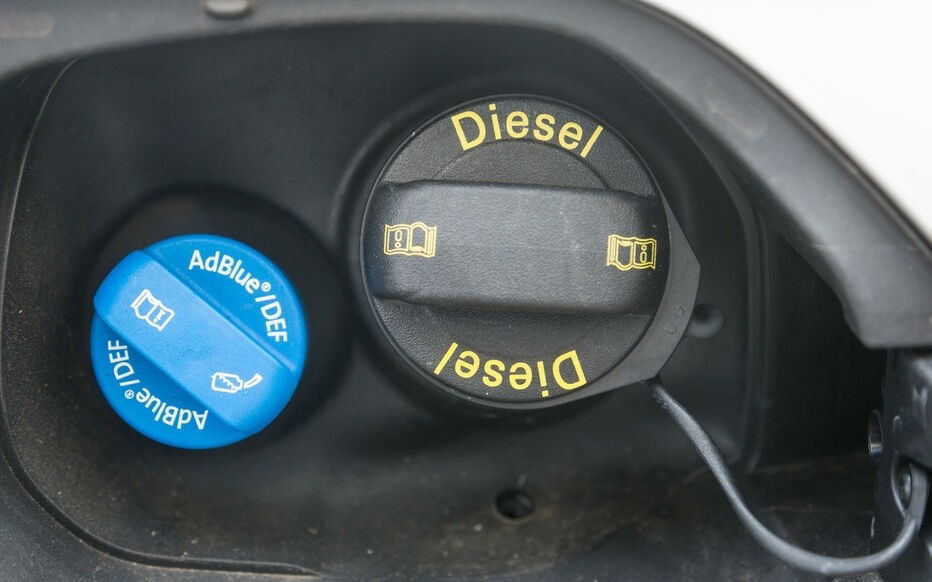Article Contents:
This post is also available in: English
Français (French)
Deutsch (German)
Español (Spanish)
The AdBlue shortage could be detrimental to the transportation business.
The problem arises from the global shortage of urea. It is an important ingredient that is used for making many things, including AdBlue (it contains about 32% urea). As a result, there was more demand than supply, which increased the prices of the important ingredient very much.
All this made us think about the future of diesel engines and the AdBlue system.
What is AdBlue?
AdBlue is a liquid consisting of urea and deionized water. This special liquid has a big role – to destroy all harmful emissions. It is injected into the vehicle’s exhaust manifold, which reacts with nitrogen oxides to form pure nitrogen and water.
The new and modern diesel engines work with an AdBlue system to meet the environmental requirements. They automatically go into “limp mode” without it. If supplies run out, that would mean thousands of trucks and other vehicles will effectively be unable to operate. That exactly makes the AdBlue crisis a hot and often-discussed topic.
Why is there an AdBlue shortage?
The problem was caused by a global shortage of urea. The organic compound – CO (NH2) 2 – is a basic ingredient of a number of things. Starting with most fertilizers and moving on to cosmetics, nutritional supplements, etc.
Increased demand for crops such as soy and wheat made farmers use more fertilizers. Thus, the demand for urea increases, which raises its price.
China is one of the largest producers of urea. But to support its farmers and supply them with urea at good prices, the government has closed its export. Australia is one of the countries hardest hit by this measure because 80% of their urea comes from Chinese producers. This had a bad effect on other countries as well.
As urea is a key ingredient found in diesel exhaust fluid (DEF) system – also known as AdBlue system, it has threatened the transport sector.
What measures have been taken to secure the AdBlue supplies?
Potential solutions to overcome the crisis with the AdBlue shortage in Australia and other countries include:
- increasing local production of urea
- re-mapping engines to accept lower-grade additives
- banning the export of most urea-based products
How does the AdBlue shortage affect to transport industry and agricultural business?
Transport industry
The shortage of AdBlue has a major impact on the transport business.
The lack increases the costs of operators and owners of vehicles with the system. On the other hand, you cannot have a working engine without AdBlue. The diesel engines will report an error and this will be a problem for their operation!
The potential transport problems could have an impact on food production, availability and costs, as well as air quality.
Agricultural business
The agricultural sector is no less affected. It could seriously suffer too.
Most of the heavy machinery used in agriculture is also diesel powered. So the farming work depends entirely on the supply of urea.
In addition, urea is an extremely important ingredient in fertilizers used in agriculture around the world.
Effective Tuning has a solution!
Effective Tuning is a reliable company that offers the best solution to the AdBlue shortage crisis. It is called an AdBlue delete, also known as AdBlue off, AdBlue removal, DEF delete, DEF off, SCR delete, or SCR off. Our tuning experts use only the Best ECU Tuning Files Online, and the Best OBD and Bench Tuning Tools to remove AdBlue! We apply the tuning files remotely to your vehicle and eliminate any risk of damage! In addition, all our tuning files are dyno-tested and custom-made!
Effective Tuning has years of experience in removing the AdBlue! So don’t hesitate to write to us. We can help you in this crisis. In addition, we offer a wide range of add-on options to choose from.
Our chip tuning solutions are 100% proven and reliable. Not only that but, our prices are the best in the worldwide market! Learn more about our prices.
Contact us today and ask about our chip tuning! Check also the solutions and benefits of our chip tuning for service shops!
You can also follow us on Facebook and LinkedIn for the latest news in the chip tuning and ECU remapping field!
This post is also available in: English
Français (French)
Deutsch (German)
Español (Spanish)


Recent Comments